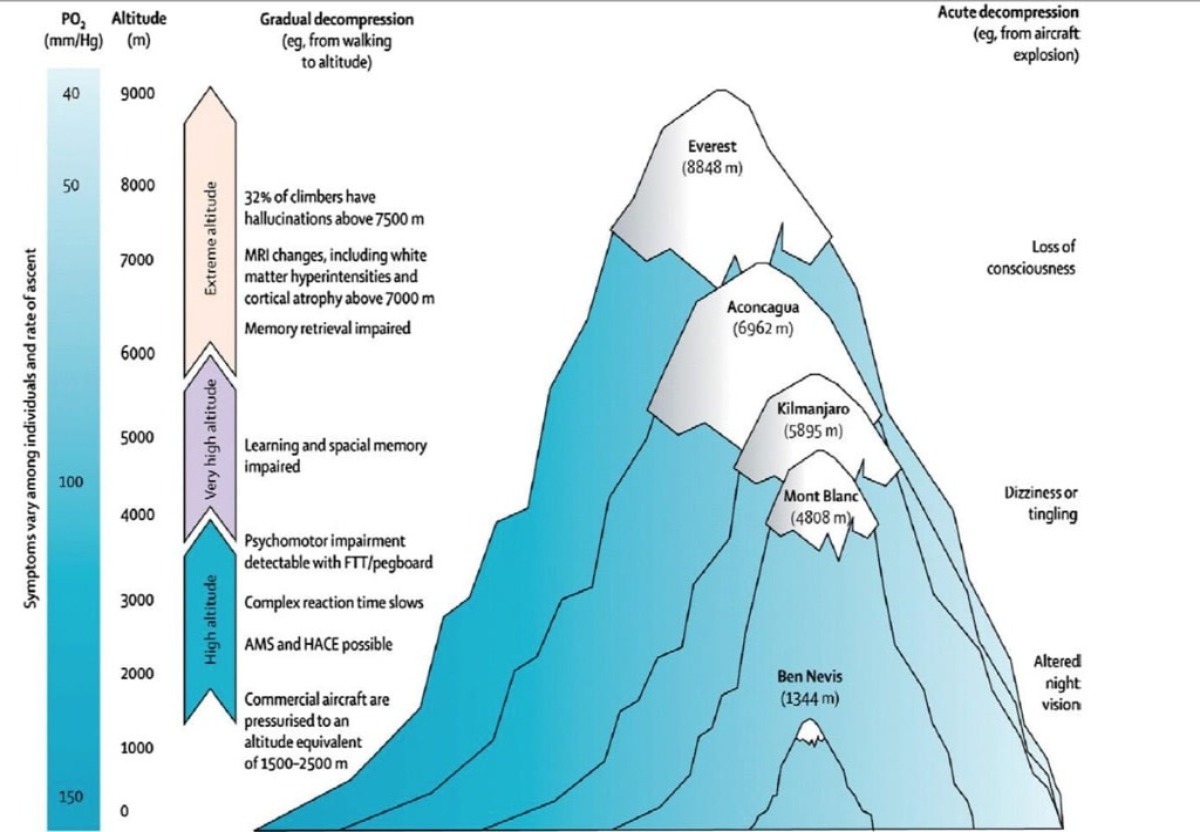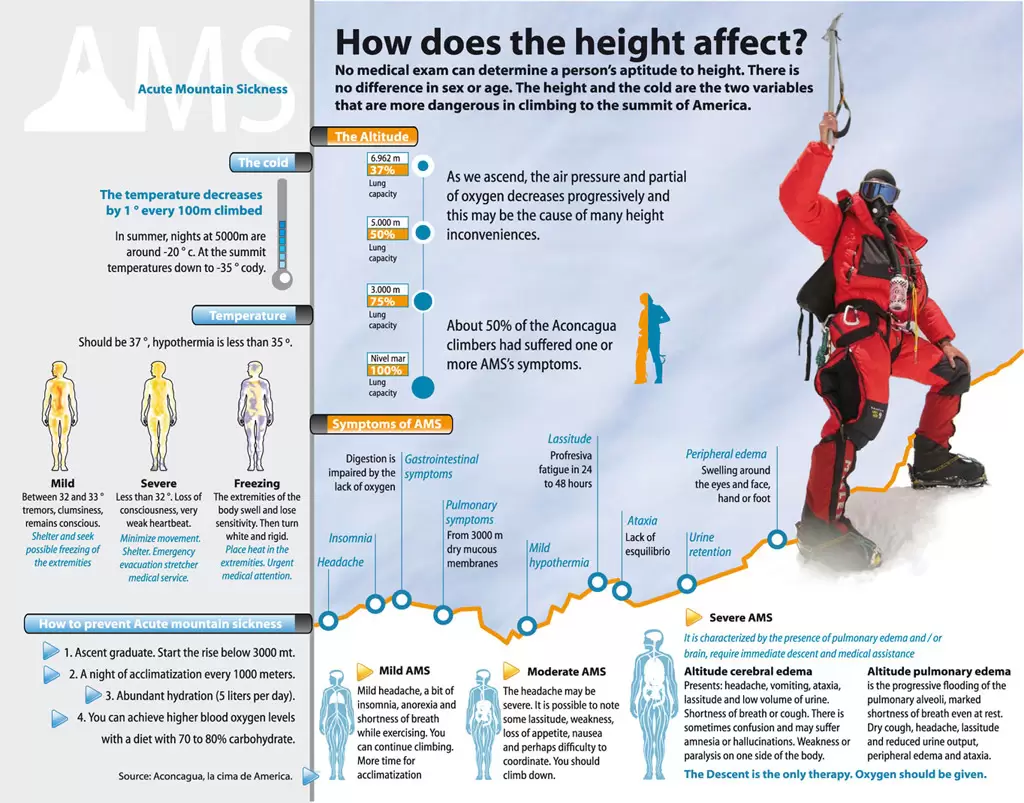What Happens To A Human Body At High Altitude
Trekking at the mighty Himalayas means high altitude. Do you know? Our body reacts to high altitudes. The human body is not accustomed to extreme heights. One needs to know all precautions before trekking. Such an activity requires both mental and physical strength. This article is highly recommended for beginners in trekking. Especially for the ones who wish to climb high altitudes like Rupin Pass, Buran Ghati, Bali Pass, etc.
What is a high altitude?
Altitude can be of three types High, Very High, and Extreme High altitudes. High altitude is from 8000 to 12000 feet, and very high altitude from 12000 to 18000 feet. Extreme high altitude is above 18000. When a human reaches 2000 feet above sea level, the oxyhemoglobin decreases rapidly. Several people can go up to 8000 feet with less hassle. If one is habituated with that height level, they can even return without a problem. Be cautious if you haven't trek to high altitudes. Higher altitudes can cause body illnesses like fast breathing, sleep disorders, headache, and vomiting.

People more than 60 years age are not recommended to trek at high altitudes. Though women have high risks than men. But nothing is predictable. It is always better to be cautious.
How Altitude differs from sea level?
The air is a mixture of different molecules. Nitrogen (79.4%), and Oxygen (20.93%) make up the majority of molecules. This composition remains stable at sea level and altitude level. With altitude, the partial pressure of oxygen changes. The partial pressure of oxygen at sea level is 159 mmHg. And the same above sea level is 53 mmHg. Oxygen molecules stay apart from each other at high altitudes, as the pressure is less to keep them together. This implies that the air we inhale has fewer oxygen molecules at the same volume. Science calls this as Hypoxia.
One breath at low altitude gives you high amounts of oxygen. As you trek upwards, pressure decreases. And oxygen molecules are scattered around. If here you take a deep breath, the same level of oxygen is absent. Thus with every ascend, oxygen molecules move further away. And you start to breathe faster. One cannot climb up to 25,000 feet directly in one day. Your body cannot adjust to such change. Your body needs several days to adjust at high altitudes. Due to this, mountain trek covers about 8 days to reach high altitudes. The action of body adjustment is called acclimatization.
What Happens to the body at high altitude?
The human body is accustomed to the oxygen at sea level. Sudden exposure to high altitude can cause a huge problem, even death. Our body at high altitude tries to intake more oxygen. Since oxygen molecules are further apart due to less pressure. We start to breathe faster. As your body feels less oxygen, it starts to increase the level of oxygenated blood. As a result, your heart pumps faster and the pulse rate increases. Presence of less oxygen limits your physical strength. At the first few hours of exposure, water loss takes place. You may suffer from dehydration. High altitude increases body metabolism which increases your appetite. One needs to have plenty of food to maintain a neutral energy balance. When exposed to a height for many days, the body starts to adjust in low oxygen level. But breathing faster remains constant. Hemoglobin level increases with blood vessels and muscle masses.
The bone marrow that manages blood counts produces more blood cells at high altitude. This can cause the jam to your body. At a higher level, you may often run to the toilet. Since our heart and lungs pump faster, it gets rid of excess fluids. Considered as unimportant body weight. While at rest in your campsite. you might have sleep disorders. Your body forgets to breathe in deep sleep. To breathe your brain wakes you up suddenly. So it's normal to have sleep disorders at high altitude. These are just changes that let your body adjust slowly. Our body's physical performance will always be less than at sea level.

One important factor, your body undergoes such changes even while resting. It has no connection with trekking or exercise. Even while laying down at high altitude, you still are consuming high energy levels. Due to overdrive. These are not abnormal nor are they symptoms of any disease. Most of our bodies adjust to height quickly. But some may respond slowly or do not respond at all. This is when we experience altitude sickness. These are not hard to treat but require knowledge before trekking.
Why do some people experience altitude sickness?
There are some people who start to get altitude sickness very soon, They start to feel sick within 6 to 48 hours of altitude exposure.
Symptoms of high altitude sickness
- Dehydration
- Sleep disorder
- Nausea
- Fast breathing
- Weakness
- Faster heartbeat
These symptoms can be treated by taking rest and drinking water.
Severe symptoms
- Chest pain
- Vomiting
- Coughing
- Confusion
- Pale skin
- Difficulty walking on a straight path.
If you experience these symptoms, go down immediately, and seek medical help. Such symptoms should not be ignored. These symptoms occur to those people, who try to ascend quickly. Hikers should climb slowly and especially if they haven't climbed earlier. It's unpredictable to say who won't suffer from sickness. Even a person with high physical strength can experience sickness. Some shreds of evidence show, people with such symptoms have less ventilatory response towards Hypoxia. Hence, few bodies are less capable of the reduction of oxygen in their systems. Such things throw impact on blood's oxygen capacity, thalassemia, and increases risk.
Why are altitude residents different from us?
Residents of high altitude have great physical strength. They are famous for their mountaineering process. These people possess high lung capacity. And greatly transports oxygen to tissues while at rest and even in exercise. There is still debate on whether it's genetic or due to their continuous exposure at high altitudes. Give your body time to adjust at each height. Do not ascend at a fast rate.